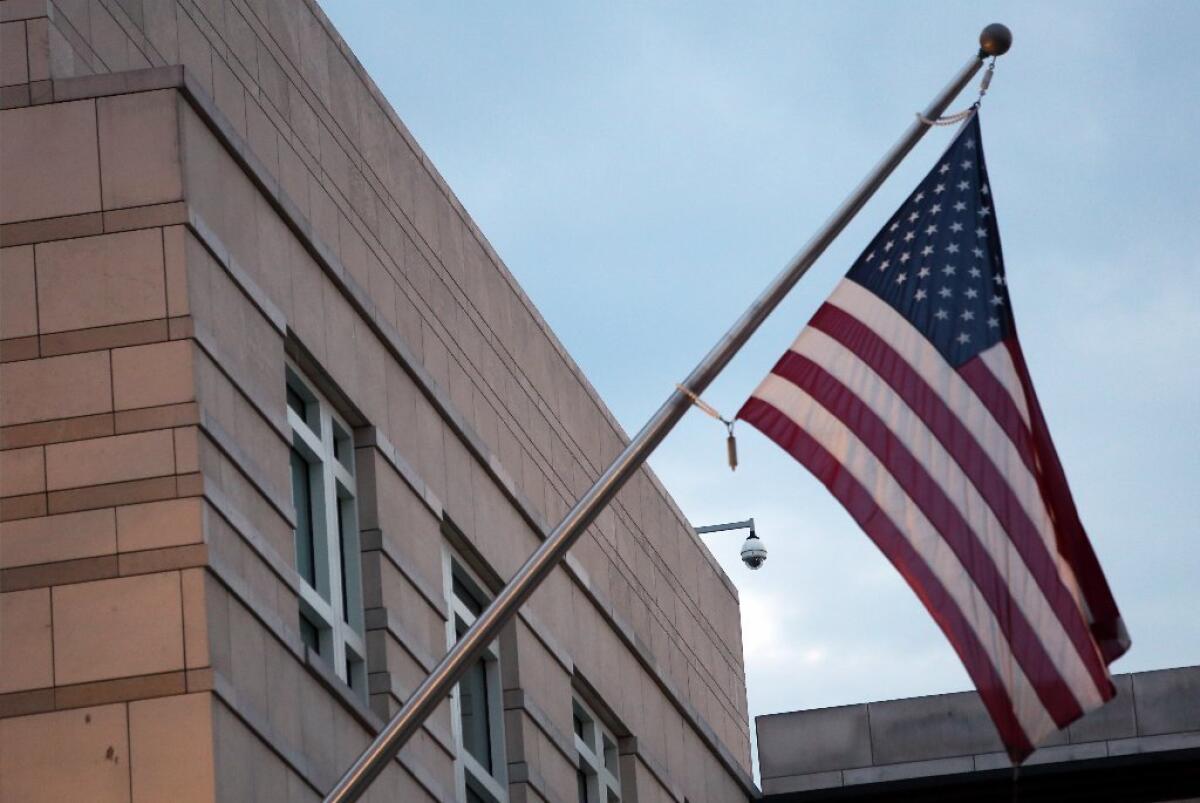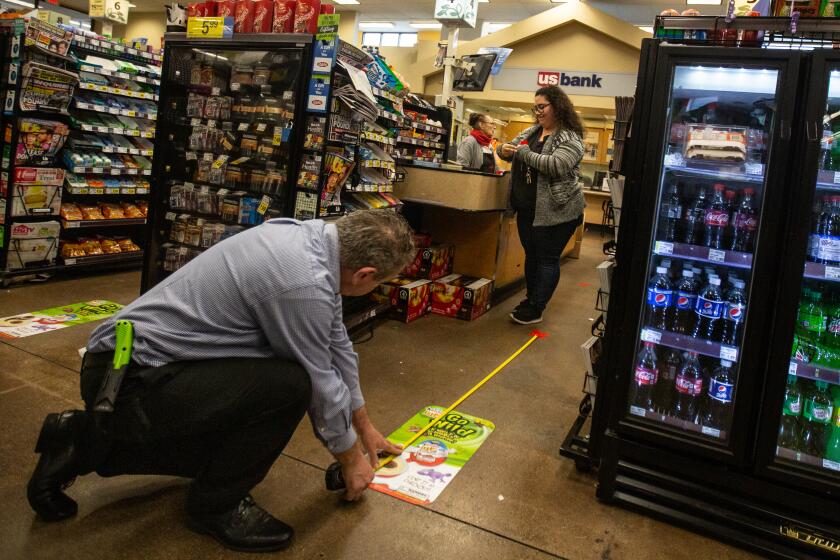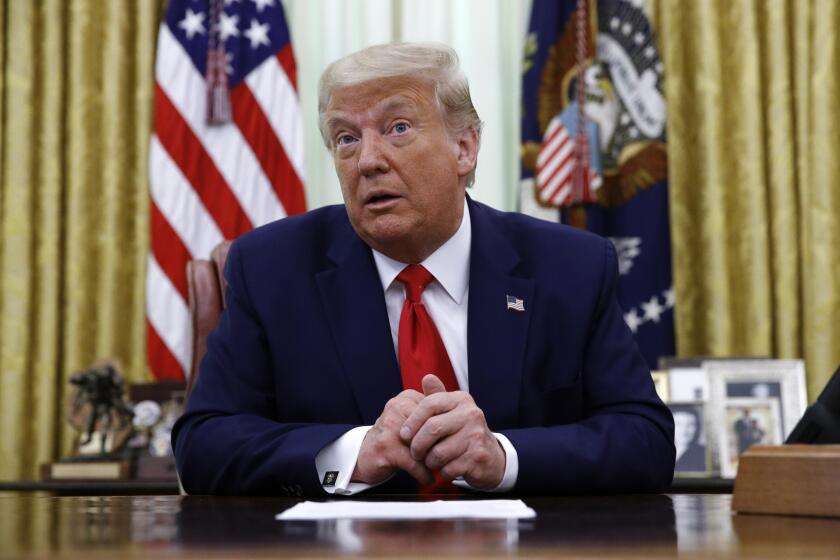How Trump’s coronavirus immigration orders affect visas and green cards

- Share via
President Trump tweeted in April that he would “temporarily suspend immigration into the United States!” leading to confusion and panic.
For those affected by the rapidly shifting regulations, it can be hard to make sense of documents written in inscrutable legalese. Tweets can’t capture the full picture of the new rules, or may distort them entirely.
“This is all very, very complex” and differs based on individual situations, said David Rugendorf, a Los Angeles-based immigration attorney. “The danger is that somebody thinks that something applies to them when it doesn’t or doesn’t realize something applies to them when it does.”
To make things easier, here’s a breakdown of recently implemented restrictions on work and resident visas. The halting of green cards, H-1Bs and other visas
A presidential proclamation that shortly followed Trump’s tweet didn’t go as far as he’d said. Pitched as a means to protect Americans’ health and jobs amid the coronavirus pandemic, the order blocked new entries of people who didn’t already have green cards or travel documents in hand, with broad exceptions.
Then in June, as some immigration experts expected, the proclamation was extended and expanded. The latest version suspends some types of work visas, including H-1B visas for skilled employees, until the end of the year. The ban on new green cards will remain in place during that time.
Proclamation overview:
- Went into effect on June 24 and will last until Dec. 31, 2020.
- Applies only to foreign nationals applying for new travel visas from abroad.
- Doesn’t affect those who already have a travel visa in their passport.
- Doesn’t immediately affect non-immigrant workers already in the U.S.
- Can be extended by the president.
From Cal/OSHA complaints to uniting with unions, workers can take some action if they feel their workplaces aren’t keeping them safe during the coronavirus pandemic.
Restricted work visas include:
- H-1B: Specialty occupations requiring expertise in fields such as IT, finance, accounting, architecture, engineering, mathematics, science and medicine. Any professional-level job that typically requires a bachelors degree or higher can fall under this category. Has become associated with tech companies.
- H-2B (other than food workers): Short-term or seasonal employees who perform non-agricultural work. Hotel, resort and trade jobs fall under this category.
- J-1 (excludes scholars and students): Trainees, teachers, interns, camp counselors, au pairs and those participating in summer work travel programs.
- L-1 (including L-1A executives and L-1B specialized knowledge workers): Intracompany transferees. Allows both U.S. and foreign multinational companies to transfer executives, managers and employees with specialized knowledge to the U.S. Often used to grow or expand multinational businesses in the U.S.
Exemptions apply to those who:
- Are deemed critical to defense, law enforcement, diplomacy or national security of the U.S.
- Provide medical care to hospitalized COVID-19 patients.
- Are involved with certain types of medical research in the U.S. to help combat COVID-19.
- Facilitate the economic recovery of the United States.
It also does not apply to:
- Lawful permanent residents (including green card holders).
- Spouses or children of U.S. citizens.
- Workers providing essential services for the U.S. food supply chain.
- Anyone whose entry is determined by the State Department or Department of Homeland Security to be in the national interest.
Limited immediate impact
U.S. embassies and consulates, where visas are processed for those applying from outside the country, are currently closed because of the pandemic. That means anyone hoping to get a visa stamp outside the U.S. is out of luck right now, regardless of the proclamation, according to several immigration attorneys. Those applying for visa classes not addressed by the proclamation can’t schedule the necessary appointments or are having those appointments repeatedly rescheduled for later dates. (Some emergency and mission-critical visa services are still going forward, according to State Department officials.)
But some are slated to open soon. The U.S. Embassy in London and the U.S. Consulate in Belfast announced they would resume select services on July 27 and Aug. 3, respectively. It’s unclear when others will open, leaving those seeking visas — and their attorneys — in the dark, according to Lea Nehme, an immigration attorney with the Path Law Group in Los Angeles.
Once they open, “then this proclamation will have more teeth, in terms of real enforcement,” said Rugendorf, a partner with Mitchell Silberberg & Knupp.
What to do
Sit tight — if possible
What happens in the November presidential election will likely determine the fate of the proclamation — and legal immigration in general, according to several immigration attorneys. If Trump is reelected, he can extend and amend the existing order. Another president could undo it immediately. If nothing is done, the proclamation will simply expire at the end of the year.
Given the many unknowns, some attorneys are advising clients to evaluate their goals and hang tight.
“You have to look at what your dream is,” said Eric Shaub, a New York-based immigration attorney who primarily works with artists. “If your dream is to live in America, the simple solution is to just defer that dream for six months and hope for a new president.”
Nehme agreed that most companies or individuals pursuing an H-1B or L visa aren’t likely to abandon hope yet, given the specialized nature of the work involved. “You really want your guy here, right?” Nehme said. If it’s going to be a few months of delay, “They’re not gonna be like, ‘Oh, let me just hire someone who doesn’t know anything about the company.’”
Seasonal and temporary workers who arrive on H-2B visas don’t have this luxury. If they miss the season they’re supposed to come for, they’ll lose the approval and have to start from square one, according to Jacob Sapochnick, an immigration attorney based in San Diego.
That goes for the employer too — who must prove that jobs can’t be filled by American workers before receiving what’s known as labor certification and bringing people in from abroad.
Instead of selecting specific people, a company usually identifies that it needs a group of workers and connects with a recruiter to fill the slots. Sapochnick pointed to an example of a hotel that needs a number of workers to ready it for reopening or provide extra cleaning services due to the coronavirus. “They’ll essentially be out of a workforce for the season,” he said, “that’s why it’s so devastating.”
Rebuffed by the Supreme Court in one attempt to tie the census to citizenship, Trump is now trying a new tactic.
Or get ahead of the game
To prepare for a change in the rules, Rugendorf has sought — and received — approval for clients in some of the suspended visa classes from U.S. Citizenship and Immigration Services (USCIS), which processes some types of visas. Unable to finalize their work permit at a consulate or embassy abroad — and potentially unable to travel due to coronavirus restrictions even if they could — they’re stuck in limbo.
One of Rugendorf’s clients, a Frenchman who received an H-1B visa through a lottery in April, has gotten approval, effective Oct. 1. But given the various restrictions, he’ll have to wait in France until January or later, Rugendorf said.
“But it’s not nothing ... it’s something,” Rugendorf said, adding that once the proclamation is lifted or modified and visa services resume “then he’ll just make an appointment at the embassy and come in.”
Employers who rely on seasonal employees can also be proactive by showing that they need the workers, Sapochnick said.
“Even if I can’t get them over here, I do have the approval to bring them over here once I can,” he said. Otherwise, if the suspension is lifted and the approval isn’t in place, “they’re going to be stuck at step one.”
Re-up
Those already in U.S. and who have valid work visas and are able to renew or extend can still do that — regardless of whether it’s one of the suspended classes.
A company can sometimes win exceptions to hire temporary workers who are critical to their business operations or who possess a unique expertise in a trade, Sapochnick said. He cited recent personal success in securing approval for a group of electrical workers.
Revise plans
A seasonal worker who would normally leave the U.S. for some time after the expiration of their visa might want to take a different track, Sapochnick said, adding that it’s not currently easy to return. One possibility is switching to a tourist visa and then re-applying for H-2B status from within the U.S., he said.
More to Read
Get the L.A. Times Politics newsletter
Deeply reported insights into legislation, politics and policy from Sacramento, Washington and beyond. In your inbox three times per week.
You may occasionally receive promotional content from the Los Angeles Times.













